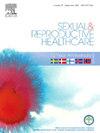The importance of patient-centered contraceptive care: Linking provider contraceptive coercion to patient psychological distress and mental well-being
IF 1.7
3区 医学
Q3 PUBLIC, ENVIRONMENTAL & OCCUPATIONAL HEALTH
引用次数: 0
Abstract
Objective
Provider-based contraceptive coercion, or pressure from a healthcare provider to use or not to use birth control, undermines patient-centered care. We investigated the relationship between contraceptive coercion and mental health, which is previously unstudied.
Methods
In 2023, we used Prolific to survey reproductive-aged people in the United States who were assigned female at birth. We conducted t-tests and linear regression to assess relationships between upward (pressure to use birth control) and downward contraceptive coercion (pressure to not use birth control) and psychological distress and mental well-being among participants who had ever received contraceptive counseling (N = 1,154).
Results
In bivariate analyses, we found a significant association between contraceptive coercion and psychological distress (upward coercion: M = 8.31 vs. 9.82, t = -3.023, p = 0.003; downward coercion: M = 8.44 vs. 10.78, t = -2.634, p = 0.009) and between contraceptive coercion and emotional (upward coercion: M = 7.60 vs. 7.04, t = 2.613, p = 0.009; downward coercion: M = 7.56 vs. 6.52, t = 2.744, p = 0.006) and psychological well-being (upward coercion: M = 15.05 vs. 14.03, t = 2.339, p = 0.019; downward coercion: M = 15.00 vs. 12.66, t = 3.018, p = 0.003). When controlling for the effects of sociodemographic factors, both upward (B = 1.06, SE = 0.50, p = 0.034) and downward coercion (B = 1.94, SE = 0.88, p = 0.027) remained positively associated with psychological distress. Although downward coercion remained negatively associated with emotional (B = -0.78, SE = 0.37, p = 0.035) and psychological well-being (B = -1.89, SE = 0.75, p = 0.012), upward coercion did not.
Conclusion
People who perceived coercion in their contraceptive care reported higher levels of psychological distress and worse mental well-being, underscoring the importance of safeguarding patients’ autonomy during contraceptive counseling to support reproductive decision-making and positive mental health outcomes.
以患者为中心的避孕护理的重要性:将提供者避孕强制与患者的心理困扰和心理健康联系起来。
目的:基于提供者的避孕强制措施,或来自医疗保健提供者使用或不使用节育措施的压力,破坏了以患者为中心的护理。我们调查了避孕强制与心理健康之间的关系,这是以前没有研究过的。方法:在2023年,我们使用多产的方法调查了美国出生时被指定为女性的育龄人群。我们对接受过避孕咨询的参与者(N = 1154)进行了t检验和线性回归,以评估向上(使用节育的压力)和向下的避孕强制(不使用节育的压力)与心理困扰和心理健康之间的关系。结果:在双变量分析中,我们发现强制避孕与心理困扰之间存在显著关联(向上强制:M = 8.31 vs. 9.82, t = -3.023, p = 0.003;向下强迫:M = 8.44 vs. 10.78, t = -2.634, p = 0.009),向上强迫:M = 7.60 vs. 7.04, t = 2.613, p = 0.009;向下强迫:M = 7.56 vs. 6.52, t = 2.744, p = 0.006)和心理健康(向上强迫:M = 15.05 vs. 14.03, t = 2.339, p = 0.019;向下强制:M = 15.00和12.66,t = 3.018, p = 0.003)。在控制社会人口学因素的影响后,向上胁迫(B = 1.06, SE = 0.50, p = 0.034)和向下胁迫(B = 1.94, SE = 0.88, p = 0.027)与心理困扰均呈正相关。向下胁迫与情绪健康(B = -0.78, SE = 0.37, p = 0.035)和心理健康(B = -1.89, SE = 0.75, p = 0.012)呈负相关,向上胁迫与情绪健康(B = -0.78, SE = 0.37, p = 0.035)呈负相关。结论:在避孕护理中感受到强迫的人报告了更高水平的心理困扰和更差的心理健康,强调了在避孕咨询过程中保护患者自主权的重要性,以支持生殖决策和积极的心理健康结果。
本文章由计算机程序翻译,如有差异,请以英文原文为准。
求助全文
约1分钟内获得全文
求助全文
来源期刊

Sexual & Reproductive Healthcare
PUBLIC, ENVIRONMENTAL & OCCUPATIONAL HEALTH-
CiteScore
2.70
自引率
5.60%
发文量
73
审稿时长
45 days
 求助内容:
求助内容: 应助结果提醒方式:
应助结果提醒方式:


